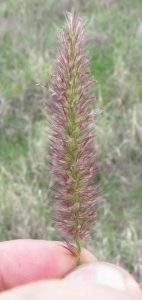BUFFELGRASS, BUFFEL GRASS (Cenchrus ciliaris)
Hawai‘i-Pacific Weed Risk Assessment Score: 10 (High Risk). Visit Plant Pono for more information.
information.
Weed Fire Risk Score = 0.85 (This species is likely a high fire risk in Hawai’i); Visit Pacific Fire Exchange Weed Risk Assessments for more information
Regulatory Status: None
Prevention and Control Category: N/A
Description
- Perennial; culms 0.25–1 m long, erect to geniculate at base, rooting in the decumbent nodes; ligule 0.6–1.5 mm long. Leaf blades 9.5–40 cm by 2–7 mm. Inflorescence 4–8.5 cm long; common axis puberulous, internodes 0.75–3 mm long; stipe 0.2–1.5 by 0.2–2 mm, base obtriangular, puberulous; burs crowded, 7.5–10 by 1.7–2.5 mm, tawny to purplish; outer bristles shorter than the inner ones, antrorsely barbed, one exserted, 10–12 mm long; inner bristles free to connate only at the very base, forming a small flat disc or cup, 7–15, erect, one spine distinctly longer than the others, margins densely antrorsely pilose. Spikelets 1–3 per bur, 3.4–4.5 mm long; lower glume 0–1.5 mm long, 1-nerved; upper glume 1.9–2.25 mm long, 1-nerved; first lemma rarely epaleate, usually paleate, sterile or male, 3–3.9 mm long, 3–5-nerved; second lemma 3.4–4.5 mm long, 5-nerved; anthers 2–2.4 mm long. Caryopsis turgid, ovoid, 1.4-1.9 mm long, ca. 1 mm in diameter.
- Native to Africa and tropical Asia, naturalized elsewhere in the Old World.
Impacts
- Forms continuous cover in arid habitats.
- Dried shoots provide a fuel for fire
- Recovers rapidly from fire
- A fire-enhanced species increasing in cover following fire.
- Seeds dispersed by wind, through attachment to animals and equipment and intentionally by people.
Uses
- Valued for its production of palatable forage and intermittent grazing during drought periods especially in dry land areas.
Distribution
Naturalized and common in dry areas and sandy soil in a wide variety of disturbed habitats, 0-120 m, on all of the main islands except Niʻihau.